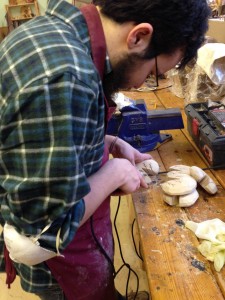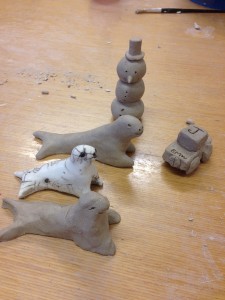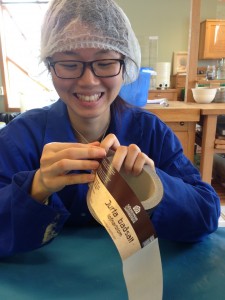As a Chinese, I always enjoy joking about “You’d better treat me well, or I will tell my people to stop making stuff for you.” Looking around in a house, you can find large part of your belongings are made in China or other developing countries, where there are cheap labor and resources available for mass production, but sometimes also cause imperfect quality. Growing up in the center of urban area, I was domesticated to view commercial products as their final states. I never thought about why a product costs its value, where and how it was made, and how it was transported to the shelf I am looking at. Until I got here in Solheimar, I had opportunities to experience producing goods from my own hands.

During the workshops we have every Wednesday afternoon, we get to take turn to participate in ceramics, wood working, greenhouse work, weaving, soap making, bakery, and candle making. One of my favorite experiences was soap making. In this workshop, we got to witness the process of making soap from scratch and produce bath salt from mixing all ingredient to sticking labels on the bottles. The sense of accomplishment is incredible. However, the more important message is that when I actually handle the ingredients and put them together carefully according to the recipe, I felt a special connection between this product in my hand and me that I do not own it, instead we coexist equally. This feeling grew stronger when I was in the wood working place, where I got to operate machines and tools to turn a piece of wood into an useful tool or decor. Even though I had tools and power to do whatever I wanted to the piece of wood, a stream of conscious of obligation and guilt occurred to me that I needed to treat it softly with tenderness as I was crafting or polishing it. The whole process was a bonding experience for us to build an intimate relationship that surpasses a human being manipulating a dead object. Similar in the greenhouse, ceramics workshop, and bakery, since I cooperate with the raw materials, I am part of the final result, which I am not only proud of, but also attached to, therefore this relationship encourages me to care for and respect these items.

If you have the opportunity, escape the world of standardized products, knit your own scarf, craft a maple branch into a spoon, grow a tomato plant, or take a lovely shower with a hand-made soap. You will realize it is the imperfection in them that is distinguishing your original and beautiful creation from the products in supermarkets. And you can proudly claim that they are made from your own hands!

-UB Qiu
